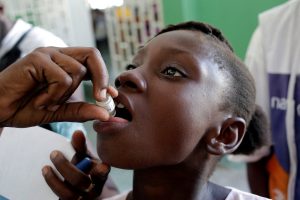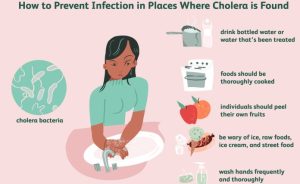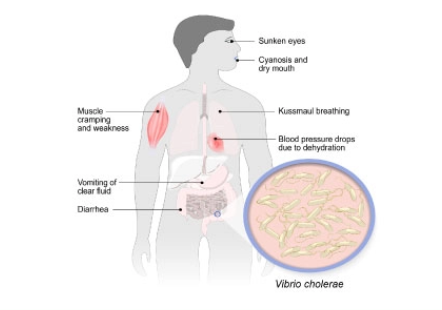The United Nations Children Fund (UNICEF) says recurrent cholera outbreaks in the Nigeria are critically affecting children and the population at large.
This is contained in a statement by Celine Lafoucrier, Chief of Lagos UNICEF Field Office, on Saturday in response to cholera outbreak in Lagos and other parts of the country.
Lafoucrier said that children faced substantial health risks, particularly those under five who were prone to severe dehydration and higher mortality rate.
She urged government to focus on the provision of clean and risk-free water to prevent the spread of cholera in the country.

According to her, despite the state government’s efforts to provide water to its population, the current outbreak demonstrates the need for an urgent government focus on ensuring the water provided to the population is clean and risk-free.
“Addressing the challenges of cholera outbreaks requires a deliberate focus of state policies. And this include provision of high-standard water and sanitation facilities as well as strengthened healthcare systems capable of responding to the demand in times of outbreaks.
Key actions include proper disposal of faeces, eliminating open defecation, and ensuring access to potable water
“There should be campaigns on cholera prevention to protect children and the population at large”, she said.
Lafoucrier said that good water and sanitation infrastructure play a crucial role in reducing disease outbreaks, such as cholera, which causes an estimated 100,000 deaths annually.
“Water, sanitation, and hygiene (WASH) interventions are fundamental in preventing and responding to cholera epidemics.
“Safe water supplies, hygienic sanitation, and effective water management are key elements in this effort. Ultimately, preventing cholera centers on good sanitation and hygiene practices.
“Key actions include proper disposal of faeces, eliminating open defecation, and ensuring access to potable water.
“Regular hand washing with clean, running water and soap is vital. Additionally, avoiding the consumption of uncooked vegetables, unwashed fruits, raw or undercooked seafood, and food from street vendors is important to reduce the risk of cholera infection”, she said.
According to her, safer water can annually prevent 1.4 million child deaths from diarrhoea, 500,000 deaths from malaria, and 860,000 child deaths from malnutrition.
avoid eating uncooked vegetables, unwashed fruits, raw or undercooked seafood, and food from street vendors
She said that it could also protect 10 million people from serious illnesses like lymphatic filariasis and trachoma.
Lafoucrier, however, said that disease outbreaks ultimately hinder Nigeria’s progress in achieving health-related Sustainable Development Goals (SDGs), particularly SDG 3, which focuses on ensuring healthy lives and well-being for all.
“These outbreaks strain Nigeria’s health system, diverting limited resources from essential services like routine immunizations and maternal and childcare, undermining universal health coverage.
“However, outbreaks also present opportunities to strengthen Nigeria’s health system.
“Prevention is more cost-effective than cure; thus, communities should establish systems that promote key hygiene practices, transforming them into a cultural norm,” she said.

Ogun govt announces precautionary measures
The Ogun government on Saturday in Abeokuta announced precautionary measures to prevent a possible outbreak of cholera in the state, following events in several states of the country.
Special Adviser to Governor Dapo Abiodun on Media and Strategy, Kayode Akinmade, in a statement said the governor was seriously concerned about the development.
“We have to take action in view of the need to protect the people in the state, considering the proximity to Lagos and the degree of interactions between the two states,” he said.
 Akinmade said precautionary measures have been put in place especially as the Sallah holiday approaches. He reeled out the measures as including the directive about toilets, stipulating that all houses must have toilets.
Akinmade said precautionary measures have been put in place especially as the Sallah holiday approaches. He reeled out the measures as including the directive about toilets, stipulating that all houses must have toilets.
“Any house without a toilet should identify a room to be converted to a toilet. Residents are given three to six months of grace for compliance.
“All petrol stations must have functional public toilets with running water as part of their corporate social responsibilities.
 “All garages, parks, markets and mechanic villages must have functional toilets with running water.
“All garages, parks, markets and mechanic villages must have functional toilets with running water.
“All schools (public and private) should have public toilets with running water,” he said; adding that, in addition to these measures, residents are advised to drink only safe water which is either boiled or chlorinated.
He also advised proper hand-washing with soap after each toilet visit and before handling food, just as all fruits and vegetables should be washed thoroughly with safe water.
cholera is highly infectious and can cause severe diarrhoea with severe dehydration
The governor’s aide further that government has advised that all foods should be cooked properly.
“Also, people should endeavour to buy and eat only food that is hot and cooked with water from reliable sources.”
Akinmade assured that the Ministry of Environment would see to the strict compliance of all the measures as violators would be made to face the wrath of law accordingly.

Oyo govt issues health alert
The Oyo State Government on Saturday in Ibadan called for more vigilance and the adoption of precautionary measures to prevent a potential cholera outbreak in the state.
The state’s Commissioner for Health, Dr. Oluwaserimi Ajetunmobi, made the call during her visit to a private hospital in Ibadan where two persons with suspected cholera cases were receiving treatment.
She pointed out that cholera is a bacterial infection spread by eating or drinking food or water contaminated by the faeces of an infected person.
Ajetunmobi remarked that cholera is highly infectious and can cause severe diarrhoea with severe dehydration, adding that it may be associated with nausea, profuse vomiting and fever.
“The two suspected cases in Ibadan, which have been tracked down to a private facility, are male workers at a construction site at Lekki Peninsula in Lagos State.”
She, however, assured that there was no cause for alarm as the Ministry and other partners were on top of the situation.
Ajetunmobi disclosed that the state government’s response efforts, through the Ministry, were aimed at ensuring the state does not record casualties from the cholera outbreak in Lagos State.
“The response efforts include: promotional jingles in English and Yoruba, running in different media houses; an immediate inauguration of the Cholera Technical Working Group; putting active isolation management centres in place; and sensitisation of the gatekeepers and other well-established community structures,” she said.
The Commissioner therefore appealed to all to be safety-conscious and always drink water only from clean sources, and practise good personal hand hygiene by frequently washing hands with soap and water.
She warned that anyone with the listed symptoms should not indulge in self-medication but present themselves at the nearest healthcare facility immediately. (NAN)


